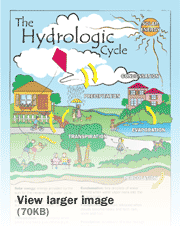Employee Reaches Milestone
Longevity Recognized
When Ron Vanlerberghe started working at the District, Lyndon B. Johnson was president, Florida was home to just over 6 million people, and the first issue of the alternative magazine “Rolling Stone” was about to hit newsstands.
Sarasota Service Office Receives National Award
District Kudos
The District was recently recognized nationally for combining function with environmentally friendly building and landscaping practices at its Sarasota Service Office.
Vergara Steps Down
Executive Director Resigns
Governing Board Chairman Ronnie Duncan received the call at 8:30 a.m. on Monday, Dec. 16. After six years at the helm, Sonny Vergara was resigning as executive director, effective Jan. 17.
Water Management Districts Receive Recognition
Excellence in Engineering
Florida’s five water management districts were recently honored as national “trendsetters” for irrigation conservation issues.
Transformation Complete
SWIM Success Story
An ugly duckling was transformed into a pollution-removing swan through a District Surface Water Improvement and Management (SWIM) project.
Students Leave a “Legacy”
Lasting Impression Through Learning
A unique environmental education program is giving Dunnellon students the opportunity to leave a lasting impression on the community.
Online Access Makes Reporting Easy
Electronic Innovation

Testing is complete!
Government Engineer of the Year
Excellence in Engineering
District employee Bill Hartmann recently received a pat on the back from his peers. Hartmann, who is a member of the American Society of Civil Engineers (ASCE), was named the Government Engineer of the Year for 2002–2003.
Campaign in Full Swing
Hispanic Outreach
Nearly 10 percent of the people who live in the District are Hispanic, and for many, Spanish is their first language. To reach that audience with a water conservation message, the District developed the Hispanic Outreach Program.

